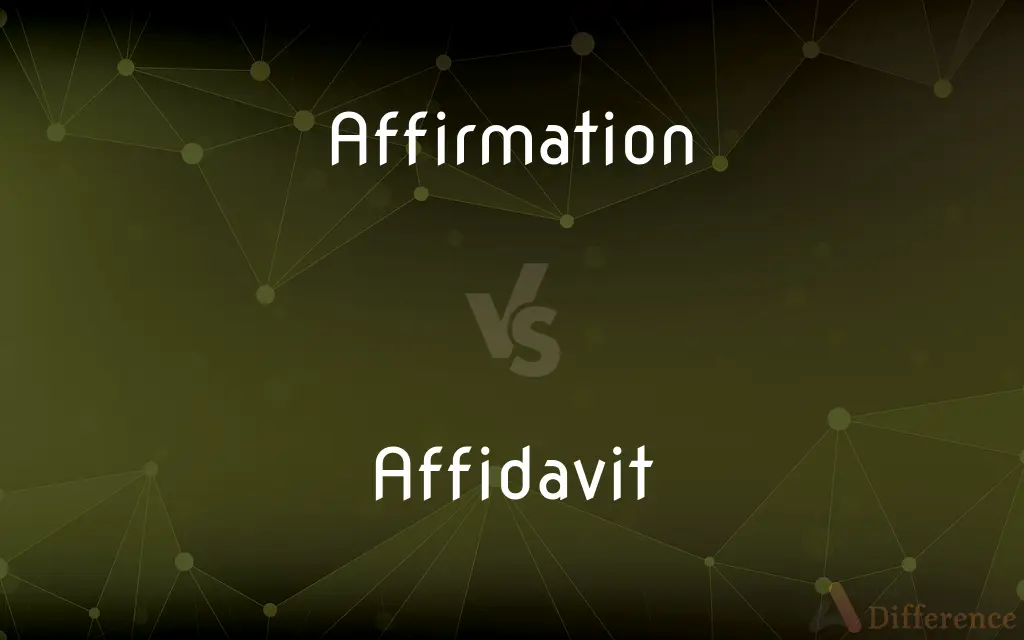Affirmation vs. Affidavit — What's the Difference?
Edited by Tayyaba Rehman — By Urooj Arif — Updated on March 24, 2024
Affirmation is a positive assertion or declaration, often without proof, while an affidavit is a written statement confirmed by oath or affirmation for use as evidence in court.

Difference Between Affirmation and Affidavit
Table of Contents
ADVERTISEMENT
Key Differences
Affirmation involves expressing agreement or confirmation towards a statement or belief, often used in a personal or spiritual context to foster positive thinking. On the other hand, an affidavit is a legal document used primarily in court proceedings or legal matters, requiring the signer to swear under oath before an authorized official that the contents are true.
While affirmations are generally personal and can be made without any formalities, affidavits must adhere to specific legal standards and are formal documents. They need to be notarized or certified by a legal authority to be considered valid for legal purposes.
Affirmations are typically voluntary expressions of belief, conviction, or support, and their validity or acceptance doesn't depend on legal verification. Conversely, the validity of an affidavit is contingent upon the truthfulness of its content, which is verified under oath, making it a powerful tool in legal proceedings.
Affirmations can be used in various settings, from self-help and therapy to daily motivational practices, and they don't carry legal weight. Affidavits, however, are instrumental in court cases, legal documentation, and formal disputes, carrying significant legal implications.
In terms of impact, affirmations aim to influence the mindset and attitude of the individual, promoting positivity and self-improvement. Affidavits, however, have a direct impact on legal proceedings, capable of influencing the outcome of court cases and legal decisions.
ADVERTISEMENT
Comparison Chart
Definition
A declaration of truth or belief without proof.
A written statement made under oath.
Purpose
To inspire or motivate oneself or others.
To provide evidence or verify facts in legal proceedings.
Formality
Informal and personal.
Formal and legal.
Verification
Not required.
Requires notarization or official swearing.
Usage
In personal development, therapy, or daily motivation.
In court cases, legal documentation, and formal disputes.
Compare with Definitions
Affirmation
A statement of positive belief.
She starts her day with the affirmation 'I am capable and strong'.
Affidavit
A written statement confirmed by oath or affirmation for use as evidence in court.
The witness's affidavit was crucial to the case.
Affirmation
The action of affirming something.
Affirmation of his commitment came through his actions.
Affidavit
A document containing a person's sworn statement.
She filed an affidavit with her application.
Affirmation
An emotional support or encouragement.
The team needed an affirmation of their efforts.
Affidavit
Used to present written evidence in legal proceedings.
His affidavit detailed the sequence of events.
Affirmation
A formal declaration by a person who does not wish to take an oath.
He chose to make an affirmation instead of swearing on the Bible.
Affidavit
A legal tool for swearing that your statement is true.
He signed the affidavit in front of a notary.
Affirmation
A declaration of the truth of something, typically with no evidence.
His affirmation of the events was enough for me.
Affidavit
A formal written statement setting out the facts of a case.
The lawyer drafted an affidavit for her client.
Affirmation
The action or process of affirming something
An affirmation of basic human values
He nodded in affirmation
Affidavit
An affidavit ( (listen) AF-i-DAY-vit; Medieval Latin for he has declared under oath) is a written statement of fact voluntarily made by an affiant or deponent under an oath or affirmation which is administered by a person who is authorized to do so by law. Such a statement is witnessed as to the authenticity of the affiant's signature by a taker of oaths, such as a notary public or commissioner of oaths.
Affirmation
Emotional support or encouragement
The lack of one or both parents' affirmation leaves some children emotionally crippled
Affidavit
A written declaration made under oath before a notary public or other authorized officer.
Affirmation
The act of affirming or the state of being affirmed; assertion.
Affidavit
(legal) A signed document wherein an affiant makes a sworn statement.
He submitted his affidavit rather than appearing to testify in court.
Affirmation
Something declared to be true; a positive statement or judgment.
Affidavit
A sworn statement in writing; a declaration in writing, signed and made upon oath before an authorized magistrate.
Affirmation
A statement intended to provide encouragement, emotional support, or motivation, especially when used for the purpose of autosuggestion.
Affidavit
Written declaration made under oath; a written statement sworn to be true before someone legally authorized to administer an oath
Affirmation
(Law) The assertion that the testimony one gives is true and equivalent to that which would be given while under oath.
Affirmation
That which is affirmed; a declaration that something is true.
Affirmation
(legal) The solemn declaration made by Quakers and others incapable of taking an oath.
Affirmation
A form of self-forced meditation or repetition; autosuggestion.
Affirmation
Confirmation of anything established; ratification; as, the affirmation of a law.
Affirmation
The act of affirming or asserting as true; assertion; - opposed to negation or denial.
Affirmation
That which is asserted; an assertion; a positive statement; an averment; as, an affirmation, by the vender, of title to property sold, or of its quality.
Affirmation
A solemn declaration made under the penalties of perjury, by persons who conscientiously decline taking an oath, which declaration is in law equivalent to an oath.
Affirmation
A statement asserting the existence or the truth of something
Affirmation
The act of affirming or asserting or stating something
Affirmation
(religion) a solemn declaration that serves the same purpose as an oath (if an oath is objectionable to the person on religious or ethical grounds)
Affirmation
A judgment by a higher court that the judgment of a lower court was correct and should stand
Common Curiosities
How are affirmations used?
Affirmations are used in personal development, therapy, and daily motivation to foster positive thinking and self-belief.
Where are affidavits commonly used?
Affidavits are commonly used in legal settings, such as court cases, to present evidence or verify facts.
What is an affirmation?
An affirmation is a positive statement or declaration of belief, often used for personal empowerment and motivation.
Can an affidavit affect legal proceedings?
Yes, affidavits can significantly influence the outcome of legal proceedings by providing sworn evidence.
What makes an affidavit formal?
An affidavit is formal due to its structure, the requirement for it to be sworn under oath, and its use in legal contexts.
What is an affidavit?
An affidavit is a written statement where the author swears under oath before a notary or other authorized official that the content is true.
Are affirmations formal?
No, affirmations are informal and can be made privately without any specific format.
Can affirmations be used in therapy?
Yes, affirmations are often used in therapy to help individuals develop a positive mindset and self-belief.
Do affirmations have legal standing?
No, affirmations are personal statements and do not carry legal weight.
Is a notary required for affirmations?
No, affirmations do not require notarization or any formal verification.
What legal implications does an affidavit carry?
An affidavit can serve as evidence in court, and lying in an affidavit can lead to charges of perjury.
How is an affidavit created?
An affidavit is created by writing a statement of facts and then swearing to its truthfulness in front of an authorized official.
What is the purpose of notarizing an affidavit?
Notarizing an affidavit verifies the identity of the signer and confirms that the statement was made under oath.
Do affirmations need to be written?
Affirmations can be spoken or written, depending on personal preference.
Can anyone make an affidavit?
Yes, anyone can make an affidavit as long as they understand the statement they are making and swear to its truthfulness before an authorized official.
Share Your Discovery

Previous Comparison
Abyss vs. Hell
Next Comparison
Stub vs. StumpAuthor Spotlight
Written by
Urooj ArifUrooj is a skilled content writer at Ask Difference, known for her exceptional ability to simplify complex topics into engaging and informative content. With a passion for research and a flair for clear, concise writing, she consistently delivers articles that resonate with our diverse audience.
Edited by
Tayyaba RehmanTayyaba Rehman is a distinguished writer, currently serving as a primary contributor to askdifference.com. As a researcher in semantics and etymology, Tayyaba's passion for the complexity of languages and their distinctions has found a perfect home on the platform. Tayyaba delves into the intricacies of language, distinguishing between commonly confused words and phrases, thereby providing clarity for readers worldwide.














































